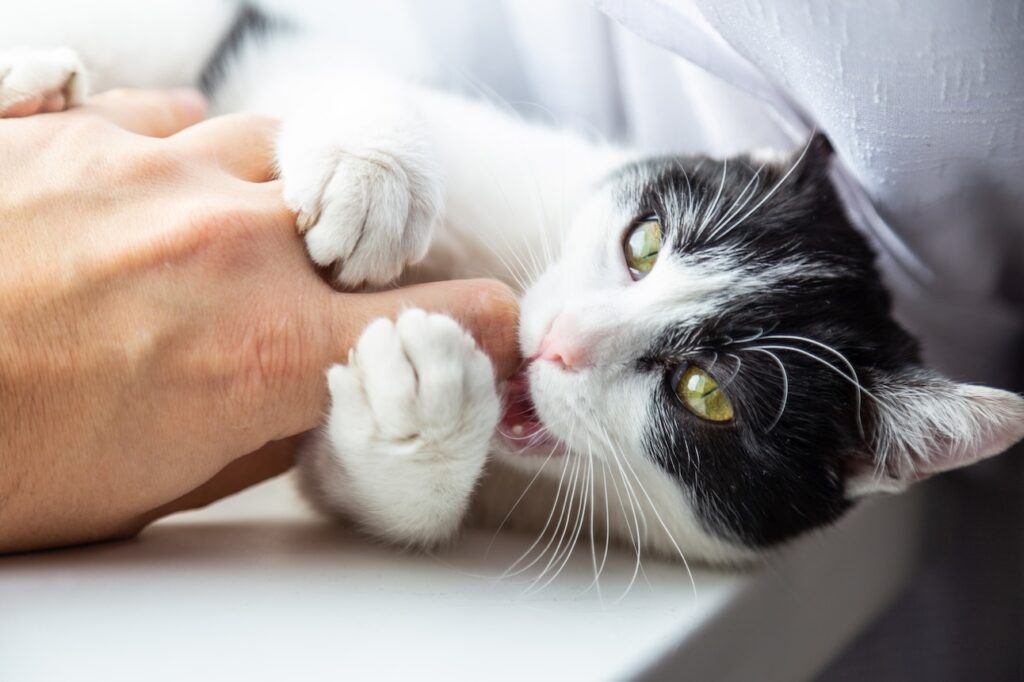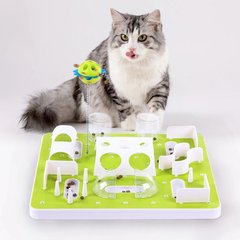Why Is My Senior Cat Biting Me?

Photo by Iurii Garmash/iStock/Getty Images Plus
When your senior cat suddenly starts biting, it can feel equal parts painful and puzzling. This is your longtime buddy, after all, and while the sudden shift in behavior may be frustrating, it isn’t generally a case of “grumpy old cat.”
Biting in senior cats often points to an underlying issue that deserves attention. By working with your veterinarian, you can better understand what your cat is really trying to communicate and help them feel more comfortable so you both can get back to enjoying their golden years filled with sunny windowsills, long naps, and kitty kisses—instead of painful bites.
Key Takeaways
- When a senior cat bites, it’s often a sign of an underlying issue.
- Common reasons why a senior cat may bite include cognitive decline, pain, or overstimulation.
- If your senior cat begins biting you, take them to the vet to rule out illnesses.
Why Senior Cats Bite
You and your cat might share a love language all your own—nose boops, headbutts, or even meowing back and forth. When your senior cat starts biting, it’s as if they’ve added a new (and not-so-fun) word to the mix.
Linda Hall, certified cat behavior specialist (ABCCT), says that cats bite to communicate, not to hurt you.
Your Cat Is in Pain
While your cat isn’t trying to hurt you, they themselves may be hurting.
An estimated 60% of cats as young as 6 years old already have some degree of osteoarthritis, which can make their joints stiff and sore, says Louisa Martin, DVM, associate veterinarian and owner of Boat Club Road Animal Hospital, in Fort Worth, Texas.
On top of that, Dr. Martin says that as cats age, many lose muscle and fat. Those spots where you typically pet your cat—like the back, hips, or rump—can feel tender or even painful to an older cat. When your senior cat nips, they may be saying, “Ouch! That spot doesn’t feel as good as it used to.”
Your Cat Can’t See, Hear, or Smell Very Well
Cats are natural hunters with incredibly sharp senses, but as they age, some of these senses can start to decline. This can leave them feeling a little more vulnerable.
“Sensory decline can make a cat less aware of their surroundings, which can lead to fear and present in the form of aggression,” Dr. Martin says. Your senior cat might startle more easily, flinch when you approach, or seem extra sensitive to petting simply because they didn’t see or hear you coming.
Your Cat Is Overstimulated
Overstimulation is a common reason why cats bite at any age. One moment they’re loving the petting, and the next they’re not.
While it may feel like the bite came out of nowhere, there’s usually a subtle sign or two leading up to it, including:
- Tail flicking or swishing
- Ears flattening or pointing backward
- Skin rippling along the back
- Tensing of the body
- Moving away from your hand
If your cat shows any of these body language cues, stop petting and let them calm down.
Your Cat Wants More Attention
As cats age, the way they play is bound to change. But that doesn’t mean they want to stop playing entirely.
“Senior cats still enjoy play, though less frequently and less actively than when they were younger due to their aging bodies,” says Emma Choi, DVM, veterinarian at Banfield Pet Hospital in San Jose, California.
This is the flip side of overstimulation. Senior cats might bite to get your attention if they haven’t had enough play, hunting, or mental stimulation. You can help meet your senior kitty’s need for play with low-impact activities, like interactive toys.
Recommended Products
Your Cat Has Cognitive Decline
Cognitive decline in cats can bring changes in behavior, which may include aggression. Similar to Alzheimer’s disease in humans, cognitive decline can’t be reversed or cured, but medications and adjustments at home can help ease symptoms for your senior kitty.
Your Cat Has Another Underlying Medical Issue
Any health problem that leaves your cat feeling “off” can lead them to express themselves in new ways, including biting.
Dr. Choi says that in addition to osteoarthritis and cognitive decline, the most common medical causes of aggression in senior cats include hyperthyroidism, dental disease, and diabetes.
What To Do if Your Senior Cat Is Biting
If your senior cat is biting you, don’t put off a visit to the vet. “Behavioral changes in senior cats, even subtle ones, are more often related to underlying medical conditions, rather than just normal aging,” Dr. Choi says.
Your vet may recommend a range of tests—a complete blood count, chemistry panel, urinalysis, and fecal analysis, to name a few. But don’t feel overwhelmed: Not every case requires all of these tests, and you always have a choice in the level of care you provide. Your vet can help prioritize what’s most important based on your cat’s health, history, and lifestyle while taking your budget into consideration.
Between vet visits, watch for signs of pain in your cat so you can handle them differently or make changes at home, such as adding an orthopedic bed.
Recommended Products
“We have so many great options for pain control in cats,” Dr. Martin says. “Anti-inflammatory and pain medications, and even a long-acting injection (a monoclonal antibody), can lessen the pain response in cats with osteoarthritis.”
For cats whose vision, hearing, or sense of smell isn’t as sharp as it once was, “announce yourself, let your footsteps signal your entrance, and always offer your hand where they can see it coming,” Hall says.








